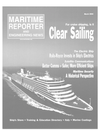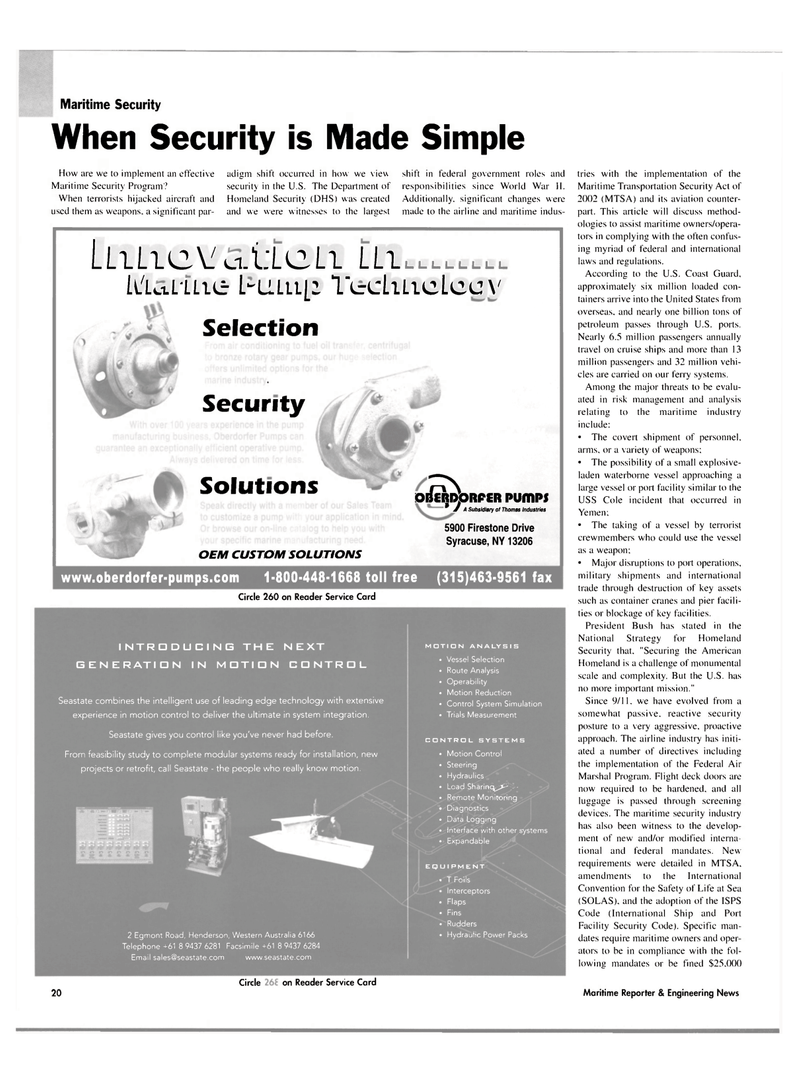
Page 20: of Maritime Reporter Magazine (March 2004)
The Cruise Shipping Edition
Read this page in Pdf, Flash or Html5 edition of March 2004 Maritime Reporter Magazine
Maritime Security
When Security is Made Simple
How are we to implement an effective
Maritime Security Program?
When terrorists hijacked aircraft and used them as weapons, a significant par- adigm shift occurred in how we view security in the U.S. The Department of
Homeland Security (DHS) was created and we were witnesses to the largest shift in federal government roles and responsibilities since World War 11.
Additionally, significant changes were made to the airline and maritime indus- tries with the implementation of the
Maritime Transportation Security Act of 2002 (MTSA) and its aviation counter- part. This article will discuss method- ologies to assist maritime owners/opera- tors in complying with the often confus- ing myriad of federal and international laws and regulations.
According to the U.S. Coast Guard, approximately six million loaded con- tainers arrive into the United States from overseas, and nearly one billion tons of petroleum passes through U.S. ports.
Nearly 6.5 million passengers annually travel on cruise ships and more than 13 million passengers and 32 million vehi- cles are carried on our ferry systems.
Among the major threats to be evalu- ated in risk management and analysis relating to the maritime industry include: • The covert shipment of personnel, arms, or a variety of weapons: • The possibility of a small explosive- laden waterborne vessel approaching a large vessel or port facility similar to the
USS Cole incident that occurred in
Yemen: • The taking of a vessel by terrorist crewmembers who could use the vessel as a weapon: • Major disruptions to port operations, military shipments and international trade through destruction of key assets such as container cranes and pier facili- ties or blockage of key facilities.
President Bush has stated in the
National Strategy for Homeland
Security that. "Securing the American
Homeland is a challenge of monumental scale and complexity. But the U.S. has no more important mission."
Since 9/11, we have evolved from a somewhat passive, reactive security posture to a very aggressive, proactive approach. The airline industry has initi- ated a number of directives including the implementation of the Federal Air
Marshal Program. Flight deck doors are now required to be hardened, and all luggage is passed through screening devices. The maritime security industry has also been witness to the develop- ment of new and/or modified interna- tional and federal mandates. New requirements were detailed in MTSA. amendments to the International
Convention for the Safety of Life at Sea (SOLAS), and the adoption of the ISPS
Code (International Ship and Port
Facility Security Code). Specific man- dates require maritime owners and oper- ators to be in compliance with the fol- lowing mandates or be fined $25,000
Maritime Reporter & Engineering News
LLiLICVa.l:LCLl LLILI-lumi ll'La-L-Uie L-LLLU[2 1\tCULICLCC V
Selection .
Security
Solutions
OEM CUSTOM SOLUTIONS
OlS^ORPER PUfllPJ
J A Subsidiary of Thomas Industries 5900 Firestone Drive
Syracuse, NY 13206 www.oberdorfer-pumps.com 1-800-448-1668 toll free (315)463-9561 fax
Circle 260 on Reader Service Card
INTRODUCING THE NEXT
GENERATION IN MOTION CONTROL
Seastate combines the intelligent use of leading edge technology with extensive experience in motion control to deliver the ultimate in system integration.
Seastate gives you control like you've never had before.
From feasibility study to complete modular systems ready for installation, new projects or retrofit, call Seastate - the people who really know motion. 2 Egmont Road, Henderson, Western Australia 6166
Telephone +61 8 9437 6281 Facsimile +61 8 9437 6284
Email [email protected] www.seastate.com
MOTION ANALYSIS • Vessel Selection • Route Analysis • Operability • Motion Reduction • Control System Simulation • Trials Measurement
CONTROL SYSTEMS • Motion Control • Steering • Hydraulic? • Load Sharinc^^- • Remote Monitoring • 'Diagnostics • Data Logging • Interface with other systems • Expandable
EQUIPMENT « T Foils
Interceptors • Flaps • Fins • Rudders • HydrautePower Packs
Circle 301 on Reader Service Card 20

 19
19

 21
21
